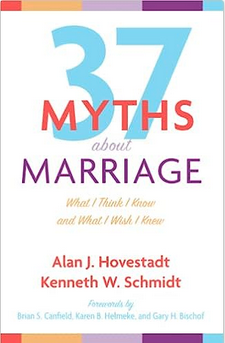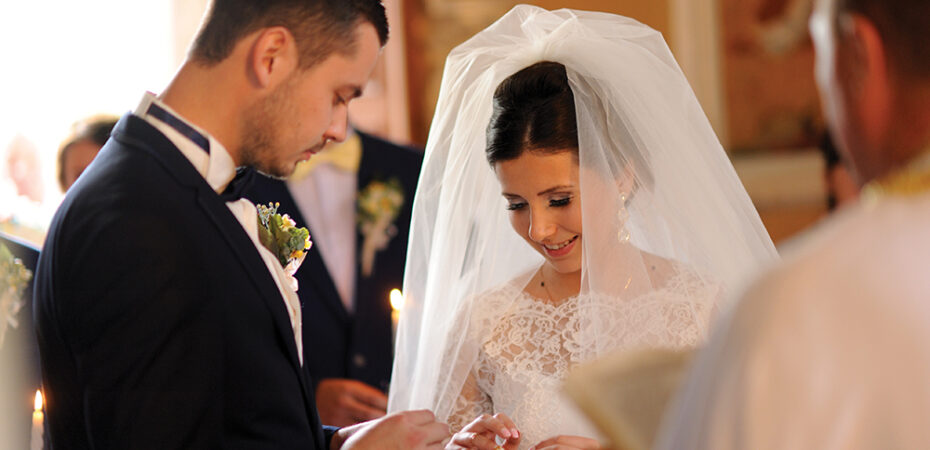Myths About Marriage
Thoughts, assumptions, opinions and values guide and influence our relationships
Dr. Alan J. Hovestadt, Father Kenneth W. Schmidt Comments Off on Myths About Marriage
What is marriage? What is marriage really like? Statistics suggest that “happily ever after” occurs no more than 50% of the time, considering how many couples divorce. Is marriage like the movies, and, if so, which movies? There are so many possibilities! How many marriages are like their parents’ marriage? Is that a good thing?
What do you think marriage is really like? And why do you think that? Because of what you read? or dreamed about? or learned in the seminary? Because of your experience with dating, or because of what you’ve seen or heard from couples?
Marriage is a pretty common experience. It’s all around us; it’s existed through most of human history and in almost all cultures. Most people get married at some point in their life. Why do they do that? What are they looking for? What do they hope to get? Why not just live together? Or date forever?
This article does not answer those questions. It does assume that, if push comes to shove, you have your own answers to those questions. Not answers supplied by theology textbooks, or researchers or therapists, but answers from your gut, based on what you have seen and heard and think you know based on your experience. Those ideas and beliefs are in your head right now. You may be aware of them, or they may be buried — but they’re there.
It doesn’t matter whether people are single, playing the field, celibate, hooking up, commitment-phobic, in a serious relationship, recovering from a breakup, living together, married, divorced or widowed. The thoughts and assumptions and opinions and values that each person has about marriage are guiding their actions and influencing their relationships every day. There are lots of words that can be used to characterize those thoughts, such as ideas, dreams, judgments, presumptions, evaluations or conclusions. Some of those beliefs may be “spot on” and others may be “off the wall.”
Experience suggests that a fair number of people (including clergy) have expectations and beliefs about marriage that aren’t very realistic. There are lots of ways to say that — messy thinking, distorted cognition, stinkin’ thinkin’, denial, ignorance and false conclusions, to name a few. And if people start with unrealistic expectations, they are likely to end up very disappointed, whether they are starting to date or in a long-term relationship.
………………………………………………………………………………………………………………………………………………….
Going Deeper
 Thirty-Seven Myths about Marriage: What I Think I Know and What I Wish I Knew (Resource Publications, $18) by Alan J. Hovestadt and Father Kenneth W. Schmidt will take readers deeper into the topic. The book provides questions for personal reflection or group discussion among individuals, couples, groups or with a personal counselor or life coach.
Thirty-Seven Myths about Marriage: What I Think I Know and What I Wish I Knew (Resource Publications, $18) by Alan J. Hovestadt and Father Kenneth W. Schmidt will take readers deeper into the topic. The book provides questions for personal reflection or group discussion among individuals, couples, groups or with a personal counselor or life coach.
………………………………………………………………………………………………………………………………………………….
They may then experience incongruity between their lived experience and what they expect (or hope for, want or need); the expectations don’t match up with your reality. In addition, American society has radically increased its general expectations of marriage so that many people are looking for the one person who can fulfill their every want and need and provide them with a very high level of life satisfaction until they die.
We subscribe to the belief articulated by one of the 20th century’s preeminent psychotherapists, Albert Ellis. He noted that irrational beliefs lead to unrealistic expectations, which then result in annoyance, discomfort and upheaval. Ellis suggests that the resolution to our emotional distress comes when we look carefully at what we’re saying to ourselves about those same upsetting situations. The “cure” is to help a client develop more rational beliefs.
We have collected a large number of irrational beliefs and ideas. We call them myths because they are widely held but false or flawed ideas. Like some myths, they contain some truth (or people would not have held onto them). Therefore, myths continue to guide personal and social behavior. When people believe a “myth” about marriage, it influences how they select the people they date, who they choose to marry and how they interact with their spouse.
We present this list of myths to you in the hope that you will begin to hear them clearly when you are meeting with couples, whether for marital preparation or pastoral counseling. They are red flags for potential problems in the relationship and they need to be addressed, not ignored or swept under the rug.
The Myths
A Dream Marriage
1. Marriage should be totally happy all the time.
2. There’s never disagreement in a happy marriage.
3. Total honesty leads to marital paradise.
4. Successful marital partners should be like twins who have everything in common.
5. Doing everything together will lead to total happiness.
6. When spouses sacrifice all their own needs, their marriage will thrive.
Seeking a Perfect Partner for a Perfect Marriage
7. There’s only one perfect person in the world meant just for you.
8. Your spouse should be able to read your mind and know what you want and need.
9. The history of your partner’s relationships doesn’t matter.
10. Living together before marriage always increases your chance of a successful marriage.
11. Every irritating behavior of your partner disappears after the wedding.
12. Your love is so powerful that you can change your partner after you get married.
13. Postpone talking about touchy issues because they go away after your wedding.
14. If something goes wrong at the wedding ceremony, your marriage will fail.
Living a Dream Marriage
15. Stability should be the highest priority of a marriage.
16. Always expect to do family rituals the way your family did.
17. There is no place for joy and laughter in marriage; it’s all serious work.
18. Make sure to hide your fears and weaknesses from your spouse.
19. Love conquers all and will keep you together.
20. Men and women are from different planets.
21. Conflict will take care of itself if you wait long enough.
22. Love always leads to change.
23. Remember that you are always right; remind your partner of this frequently.
24. Take credit for everything that goes well.
25. Spouses should keep score.
26. Always blame your partner for your problems.
27. Your spouse is always the cause of financial problems in your marriage.
28. Engage in “marital archaeology” by digging up the past.
29. Exaggerate the negative and minimize the positive to help your spouse grow.
30. Give your partner an abundance of cold pricklies, because warm fuzzies are overrated.
31. Never ever forgive your spouse.
32. The only way to express affection in marriage is to have sex.
33. Hitting is permissible and necessary in marriage.
A Dream Marriage Becomes Paradise Lost
34. If your marriage is not going well, then it’s obviously your fault, which means you’re unlovable and worthless.
35. When your marriage is strained, seek advice from everyone who will listen to you.
36. Always stay in a dysfunctional marriage so that your children will be OK.
37. There are several simple ways to save a marriage.
One cautionary note — at some point, you may think to yourself or hear someone else assert that “#X is not a myth!” You may have heard someone sincerely state that myth, or perhaps you read it on the internet somewhere, or maybe you know a couple like that and it doesn’t seem to be a problem. It’s just possible that you believe that myth yourself, and that can be a shock. Just because you can’t see it’s a problem doesn’t mean it isn’t.
It’s a temptation to disregard a myth because it strikes close to home. Sometimes we may be tempted to disregard a myth that really scares us, and that may be the most dangerous act of all. The same is true when working with a couple — when you point out the myth, they may engage in denial.
Take time to listen and explore what they really think; help them to nuance it, to step away from the extreme thinking that underlies many of the myths — for example, “sometimes” is very different from “always.” They may decide to get some assistance; they don’t have to wait until things become “big problems.” Encourage them to adjust their thinking and try some new behaviors, so that their marriage can be more like they want it to be.
FATHER KENNETH W. SCHMIDT, MA, LPC, NCC, is the advocate for priestly ministry and support in the Diocese of Kalamazoo, Michigan. ALAN J. HOVESTADT is past president of the American Association for Marriage and Family Therapy and a marriage and family counselor/educator.
…………………………………………………………………………………………………………………………………………….
U.S. Bishops’ Pastoral Letter on Marriage
In November 2009, the U.S. Catholic Bishops approved a pastoral letter called “Marriage: Love and Life in the Divine Plan.” The letter presents the essential points of Catholic teaching on marriage as a natural gift, as a sacrament and as a public commitment between a man and a woman. It also discusses several contemporary challenges to marriage and how the Church addresses those challenges. For more information visit the Marriage and Family Life Ministries at usccb.org.
………………………………………………………………………………………………………………………………………………





